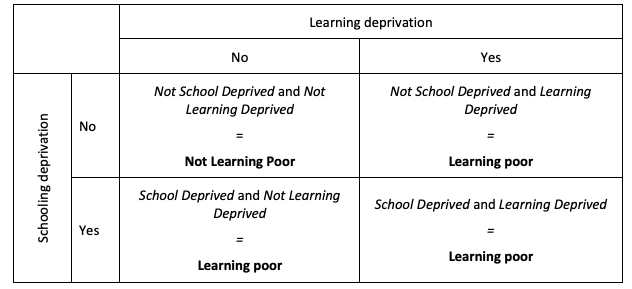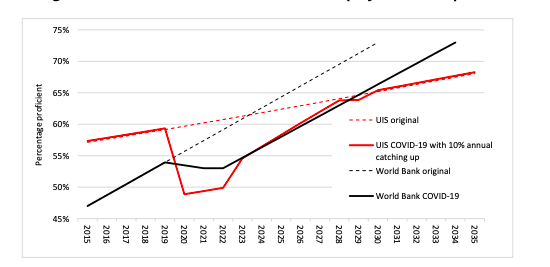Global education and development efforts have recently focused on the long-term effects of Learning Poverty (defined by the World Bank as the inability to comprehend a simple piece of text by age 10) on life outcomes. When students fail to achieve foundational knowledge in their primary years it is strongly predictive of their lifetime educational attainment. Learning Poverty has profound effects on the health, well-being, long-term earning potential, and social welfare of students worldwide, with particularly acute costs for women and girls.
COVID-19 has only made matters worse with learning disrupted for some 1.6 billion students globally. Prior to the pandemic more than half of students in low to middle income students experienced learning poverty. If current projections are borne out, pandemic-related disruptions could increase this rate significantly, causing more than 60% of students in low to middle income students to experience Learning Poverty in the years ahead.
Learning Poverty is thus quite rightly acknowledged as a major threat to SDG4, and as the World Bank has noted its elimination should be given the same primacy, and treated with the same level of moral urgency as the elimination of extreme poverty, stunting, or hunger.
Learning poverty: An issue of access, quality and equity
As João Pedro Azevedo, the Lead Economist for the Global Practice Group has observed, Learning Poverty is best conceptualized as reflecting both dimensions of deprivation targeted by SDG 4: access to schooling, and access to learning.

Across the globe, (including in upper-middle income and more developed contexts), evidence has emerged that both of these dimensions of deprivation – access and quality – were adversely impacted over the last 18 months, due to school closures and lost instructional time, as well as the erosion of previously gained knowledge by students as students adapted to new learning modalities (such as remote or hybrid instruction). This is despite the heroic efforts of teachers to adapt to the circumstances of the global Covid-19 pandemic.
The good news is that due to innovations in technology and learning science we have the means to mitigate these effects. As Mr Azevedo, who has simulated the possible long-term impacts of global disruption, has noted, the most dire scenarios need not come to pass. In his words:
School reopening, when safe, is critical, but it is not enough…the big challenge will be to rapidly identify and respond to each individual student’s learning needs in a flexible and adaptive way and to build back educational systems more resilient to shocks, using technology effectively to enable learning both at school and at home.
These conclusions by the World Bank mirror work by the UN Institute of Statistics that examined major education disruptions historically and found that recovery time could be halved if dedicated efforts at “catch-up” or acceleration are pursued.
Specifically the UN projects that full recovery to pre-pandemic improvement trajectories can occur by 2025 with 20% acceleration (students on average growing their proficiency by 1.2 years in a single calendar year). This is a rate which is achievable in both low to middle income and more developed contexts by integrating and embedding currently available technology into core instructional strategies. In the absence of these efforts, recovery to prior improvement trajectories is not expected until 2030.

Why foundational maths will be key to mitigating learning poverty
To meet the twin goals of both deploying effective remediation strategies to address the recent crisis and building systemic resilience, a global focus on foundational literacy must be complemented by a similar global focus on foundational mathematics.
According to a number of recent studies by multilateral organizations and research universities, students have lost the most ground in mathematics, while in some instances, sustaining progress in literacy. While the precise cause of these trends have not yet been fully elaborated, some intuitive explanations suggest themselves. The cumulative and sequential nature of maths education, which relies on student mastery of prior concepts to support the acquisition of more advanced knowledge and skills, may make maths more dependent than other subjects on continuity of instruction.
A focus on foundational maths will only complement and reinforce the current global focus on foundational literacy. As the US-based Education Commission of the States has noted, early-grade maths is cognitively foundational, reliably predicting success in maths through secondary school, and in some cases serving as an even stronger predictor of later reading achievement than even early literacy skills. Early exposure to rigorous maths instruction has lasting impacts on literacy including vocabulary, inference, independence, and grammatical complexity. Research also suggests that mathematics is core to success across academic subjects.
Foundational maths attainment has been shown to predict key life outcomes like earnings, savings, home-ownership, and marriage. Employers consider foundational numeracy to be essential skills for workers. Additionally, as automation and digitization create major changes in the future of work, foundational maths proficiency will be increasingly essential in ensuring that students possess the skills to remain relevant to employers across a range of sectors and industries. A failure to address foundational maths as part of core academic preparation will lead more students to drop out of school with disastrous consequences for their economic and social prospects. To this end, Learning Poverty would benefit from an extended definition that includes global measures of foundational maths.
If not now then when?
The international community has a once in a generation chance to not only respond to the pandemic, but to ‘build back better’ by committing to a more resilient approach to education that can put all countries on a trajectory to achieve the ambitious goals of SDG4.
Doing so requires putting foundational maths on a par with foundational literacy as part of a comprehensive strategy for addressing Learning Poverty, in a way that takes advantage of the affordances of new technologies and pedagogical approaches which address students’ individual needs and measurably reinforce their foundational maths knowledge.
